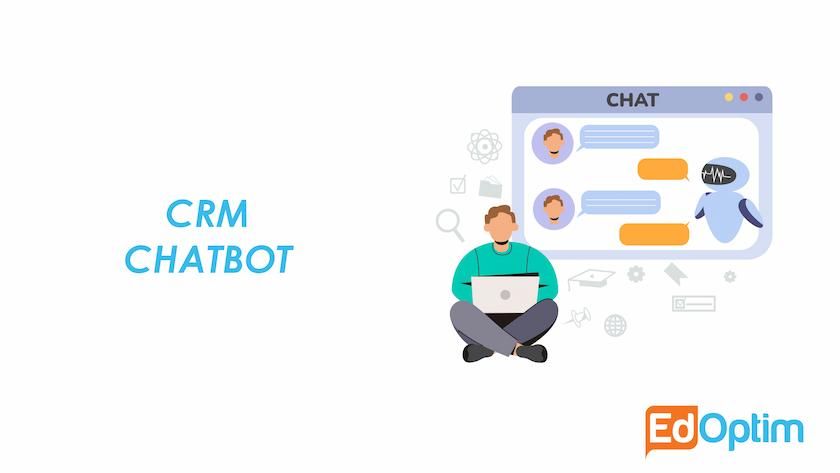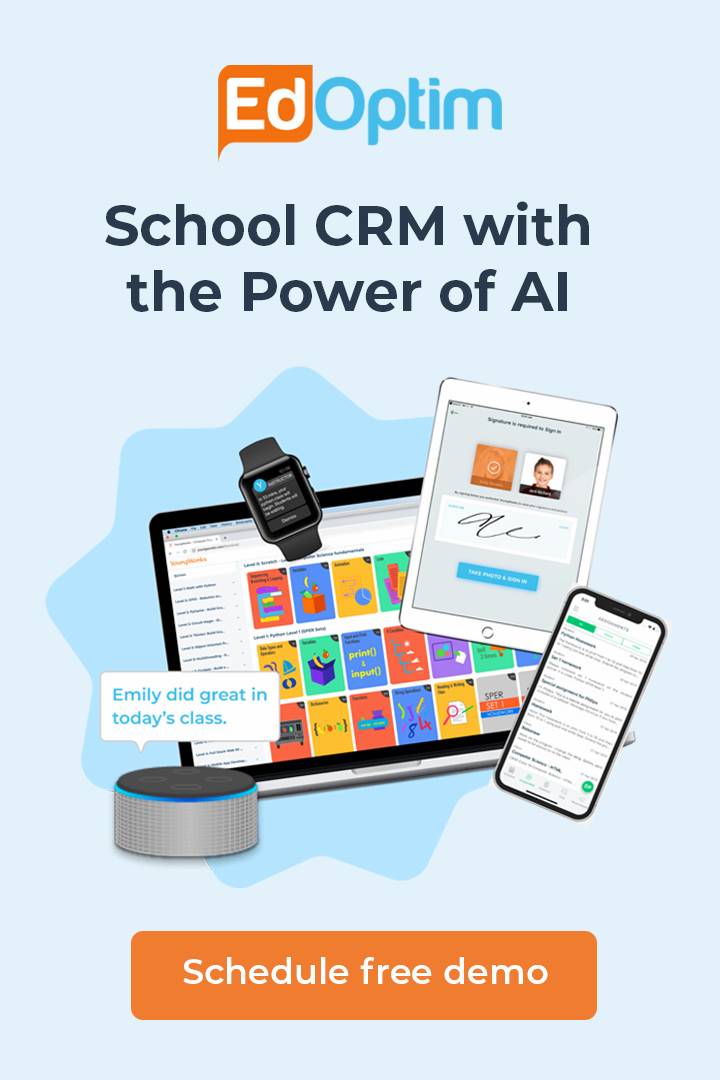May 13, 2024 By Team EdOptim *
What is the Role of a AI-Powered Chatbot in CRM? What Functionality Do CRM Chatbots Offer?
A CRM chatbot serves as a virtual assistant, handling customer inquiries, providing product information, and assisting with transactions directly within the CRM system. Chatbots can automate lead qualification processes, gather prospect data, and nurture leads through personalized interactions.
The CRM chatbots have a lot to offer:
- Lead generation: Qualify leads based on predefined criteria and capture prospect information for sales follow-ups.
- Customer data management: Update CRM records, gather customer preferences, and segment contacts based on chatbot interactions.
- Personalized recommendations: Recommend products or services based on customer preferences and past purchases.
- Workflow automation: Trigger workflows and actions within the CRM system based on chatbot interactions.
Benefits of AI-Powered Chatbots in Lead Generation
The following are some of the benefits of AI-powered chatbots in lead generation:
- Qualify leads in real-time: Engage prospects in meaningful conversations to assess their interest and readiness to engage with sales representatives.
- Nurture leads through personalized outreach: Follow up with leads based on their interactions and preferences, increasing the likelihood of conversion.
- Optimize lead scoring: Use predictive analytics to prioritize leads based on their likelihood to convert, improving sales team efficiency.
CRM Chatbots to Automate Customer Support
A CRM chatbot significantly automates customer support by tackling various tasks. It efficiently manages FAQs by offering instant answers to frequent customer questions, thus ensuring that basic inquiries are resolved without delay. Additionally, the chatbot aids in order tracking by providing timely status updates and delivery notifications, keeping customers informed about their orders. It also enhances the efficiency of appointment scheduling processes by enabling customers to book meetings via conversational interfaces, streamlining what was once a more complex, time-consuming task.
CRM Chatbots to Enhance Customer Experience and Satisfaction
CRM chatbots enhance the customer experience and satisfaction in different ways. Some of them are:
- Provide 24/7 availability: Offer round-the-clock support and instant responses to customer inquiries, improving response times and accessibility.
- Personalize interactions: Utilize customer data stored in the CRM system to deliver tailored responses and recommendations.
- Seamless omnichannel experience: Enable customers to transition between different communication channels (website, mobile apps, social media) while maintaining context.
- Increase efficiency: Resolve inquiries quickly and accurately, reducing wait times and minimizing customer effort.
- Consistent service quality: Deliver consistent responses and follow predefined workflows to ensure a standardized customer experience.
- Empower self-service: Allow customers to find information and complete tasks independently, empowering them to accomplish their goals efficiently.
Integrating Chatbots with CRM Systems, Business Processes and Multiple Channels
Chatbots significantly streamline business processes within CRM systems by automating several critical functions. They populate CRM records with information gleaned from chatbot interactions, thus reducing the burden of manual data entry tasks. Additionally, chatbots facilitate appointment scheduling by allowing customers to book appointments directly through their interfaces, ensuring schedules are perfectly synced with CRM calendars. They also play a crucial role in providing real-time insights by surfacing actionable data and analytics drawn from interactions, thereby empowering sales and support teams with valuable information to drive decision-making.
Integration with multiple channels and platforms enables chatbots to provide seamless assistance across various digital touchpoints. Chatbots can be embedded directly on websites, offering real-time engagement and support to visitors. They also connect with platforms like Facebook Messenger and WhatsApp, allowing businesses to meet customers on their preferred social channels. For mobile users, in-app chatbot functionality ensures personalized assistance is always within reach. Beyond direct interactions, these chatbots are equipped to engage with customers by responding to comments and messages on social media platforms, guiding them through product selections and purchases within social messaging apps, and even collecting valuable feedback and reviews. This comprehensive approach enhances brand engagement and reputation by fostering a responsive and interactive customer service environment.
CRM Chatbots in E-commerce
E-commerce chatbots assist customers with product discovery, order placement, and payment processing, including credit card transactions and secure checkout. Chatbots streamline repetitive tasks such as order tracking, returns processing, and subscription management within e-commerce platforms.
The role of chatbots in enhancing user experience in e-commerce:
- Recommend personalized products: Analyze customer preferences and purchase history to suggest relevant products or promotions.
- Simplify checkout process: Assist customers with completing transactions, handling payment processing, and providing order confirmations.
- Resolve customer inquiries: Address common e-commerce issues such as shipping inquiries, product returns, and account management.
CRM Chatbot Pricing and Templates
Pricing models for CRM chatbots vary based on factors such as usage volume, features, and integration capabilities with CRM systems. Businesses should consider scalability and cost-effectiveness when evaluating chatbot solutions to ensure alignment with budgetary constraints and expected ROI.
Chatbot templates provide pre-built conversation flows and layouts tailored to specific industries or use cases, enabling rapid deployment and customization. Templates streamline chatbot implementation by offering predefined interaction paths for common scenarios such as lead generation, appointment scheduling, and customer support.
APIs for Chatbots and CRM Platforms
APIs (Application Programming Interfaces) enable seamless data exchange between chatbots and CRM systems, allowing chatbots to access and update customer information in real-time. Integration via APIs empowers chatbots to leverage CRM functionalities such as lead management, contact profiling, and task automation.
Chatbots with Human Agents in CRM
Chatbots work alongside human agents in CRM to boost customer service. They hand off complex issues to humans, guaranteeing customers get the help they need. Chatbots also give agents key customer data and history, allowing for personalized support. This teamwork ensures smooth transitions from chatbot to human support, keeping customer service seamless and efficient.
How Can Chatbots Utilize Customer Data to Improve Services?
Below are various methods chatbots employ to use customer data:
- Customized Conversations: By tapping into comprehensive CRM data, chatbots can significantly enhance the user experience. They achieve this by customizing conversations according to the specific preferences, purchase history, and behavior patterns of each customer. This personal touch not only fosters a stronger connection but also makes interactions more relevant and engaging.
- Predictive Assistance: Leveraging the power of predictive analytics enables chatbots to not just react to customer inquiries but to anticipate them. By analyzing past interactions and customer behavior, chatbots can forecast future needs and offer solutions before the customer even recognizes the necessity. This proactive approach can greatly reduce friction and improve the overall customer experience.
- Refinement of Engagement Techniques: Continuously analyzing the data generated from customer interactions allows for the ongoing refinement of chatbot communication strategies. This iterative process ensures that responses are not only more precise but also that the engagement is optimized to increase satisfaction levels and bolster customer loyalty. This strategic analysis leads to a better understanding of what drives customer engagement and paves the way for more effective communication strategies.
Industry-Specific Applications of CRM Chatbots
The following are some of the industry-specific applications of CRM chatbots:
- Healthcare: Assist patients with appointment scheduling, medication reminders, and telehealth consultations.
- Finance: Provide account information, process transactions, and offer financial advice and recommendations.
- Retail: Enhance shopping experiences with personalized product recommendations, order tracking, and customer support.
Future Trends in CRM Chatbots
In the future, we can anticipate significant advancements in CRM chatbots, including the development of advanced conversational AI that can manage more complex and context-aware conversations. There will also be a push for deeper CRM integration, aimed at enhancing data sharing and synchronization between chatbots and CRM systems to achieve a unified customer view. Additionally, the use of AI-driven insights for enhanced analytics and reporting will become critical, enabling the measurement of chatbot performance and the optimization of customer engagement strategies.
Choosing the Right CRM Chatbot Solution
The factors that businesses should consider when implementing a CRM chatbot are:
- Chatbot functionality: Evaluate features such as natural language understanding, conversation flows, and integration capabilities with CRM systems.
- Scalability and customization: Choose a chatbot platform that can adapt to evolving business needs and workflows.
- Security and compliance: Ensure that the chatbot solution adheres to data privacy regulations and offers robust security features.
- Vendor support and training: Select a vendor that provides comprehensive support, training resources, and ongoing maintenance for successful chatbot implementation.
In conclusion, CRM chatbots play a transformative role in modern customer relationship management, offering businesses the ability to automate workflows, optimize customer interactions, and deliver exceptional experiences across multiple channels. By harnessing the power of AI and NLP, organizations can streamline operations, boost customer satisfaction, and drive revenue growth through personalized engagement and efficient automation within CRM systems. As technology continues to evolve, CRM chatbots will remain indispensable tools for businesses seeking to elevate their customer relationships and stay competitive in a dynamic market landscape.
FAQs related to CRM Chatbots
The following are some of the frequently asked questions related to CRM chatbots.
What Microsoft Tools Can Enhance CRM Chatbot Capabilities?
Microsoft offers tools like Azure Bot Service and Power Virtual Agents that enable businesses to build and deploy chatbots integrated with Microsoft Dynamics 365 CRM. These tools leverage Microsoft's AI capabilities, empowering chatbots to deliver personalized customer experiences and streamline sales processes.
How Do Chatbots Engage Website Visitors and Mobile App Users?
Chatbots embedded on websites greet visitors, provide assistance, and guide them through the customer journey, increasing engagement and conversion rates. Mobile app chatbots offer in-app support, product recommendations, and transactional capabilities, enhancing user experience and driving app retention.
What Role Do SMS Chatbots Play in Reps and Customer Interactions?
SMS chatbots engage customers via text messaging, providing personalized updates, order notifications, and support services through SMS channels. Sales reps can use SMS chatbots to follow up with leads, schedule appointments, and facilitate conversations without leaving their CRM environment.
How Does Natural Language Processing (NLP) Enhance Chatbot Interactions?
Natural Language Processing (NLP) significantly enhances chatbot interactions through various capabilities. It allows for the understanding of intent and context by analyzing customer queries to determine the underlying intent and provide contextually relevant responses. Furthermore, NLP enables the handling of complex conversations by processing conversational nuances, including slang, abbreviations, and variations in language, thereby delivering accurate and natural interactions. Additionally, sentiment analysis is a critical feature, where NLP analyzes customer sentiment based on language cues to tailor responses and escalate issues appropriately. This multifaceted approach ensures that chatbots offer more personalized and efficient customer service.
*Contributors: Written by Prasanna Gurumallapla; Edited by Rohit Budania; Lead image by Shivendra Singh

